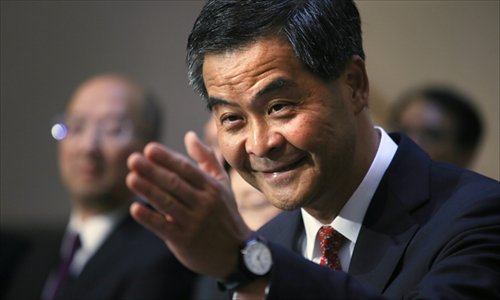NPC approves HK suffrage
Opposition groups rally against election plan

Chief Executive Leung Chun-ying gestures during a press conference in Hong Kong Sunday. The National People's Congress Standing Committee announced Sunday that all candidates for Hong Kong's 2017 chief executive election must receive more than half the votes from a special nominating body to go before voters. Photo: AP
China's top legislature on Sunday adopted the legal framework for Hong Kong's first chief executive election by universal suffrage in 2017, as it warned that the rising illegal activities in the city could undermine Hong Kong's rule of law and social stability.
The framework, approved unanimously by the Standing Committee of the National People's Congress (NPC) on Sunday at the closing session of its bi-monthly meeting, gave the go-ahead for the city to choose its next leader by universal suffrage starting from 2017.
The electoral method is detailed in the draft decision, and states the city's next chief executive will be nominated by a "broadly representative" committee made in accordance with those of the existing 1,200-strong election committee which consists of four sectors.
The decision allows two to three candidates to run in the next race for Hong Kong's top post, who will have to gain the support of at least half of the nominating committee members before they could run in the election.
Opposition activists say the decision, in effect, shuts the door for pan-democrats to run. But the central and Hong Kong governments say it represents a solid step forward.
"The decision is vital for steadily developing democracy in Hong Kong and implementing the selection of the HKSAR Chief Executive by universal suffrage according to the law," top legislator Zhang Dejiang, said at remarks at the NPC Standing Committee's closing meeting, the Xinhua News Agency reported.
Chief Executive Leung Chun-ying hailed the decision as "a major step forward in the development of the Hong Kong society," adding that the government will launch the second round of public consultation before the framework is put to a vote in the first quarter of 2015.
"With the NPC's decision, a new legal framework for Hong Kong's upcoming elections has been formed," Tian Feilong, a legal expert at Beihang University and visiting scholar at the University of Hong Kong, told the Global Times.
Tian said the framework is in line with the Basic Law and the NPC's decision in 2007, and will not be reversed despite opposition by some lawmakers and pro-democracy activists in Hong Kong.
While the framework will require at least two thirds of Hong Kong's 70-strong-member legislature to pass, a group of 25 Hong Kong lawmakers claimed they will veto the framework at the city's legislative meeting, reported Hong Kong-based radio station Commercial Radio.
"Not all of the [pro-democracy] politicians and activists are advocating public nominations at this stage, but the requirement stated in the framework, which states that candidates require support from over half of the nominating committee members, has become their primary concern as they think they might be excluded from the race," Priscilla Lau Pui-king, a Hong Kong NPC deputy, told the Global Times.
Tian said he believes it is essential for lawmakers to set aside their own political interests and support the framework for the city's political reform to move forward.
The 5 million would-be voters would lose the chance to select their next leader if the framework was not passed by the city's legislature, warned Leung at the press conference on Sunday.
The political reform draft decision said that if the framework is not passed by Hong Kong's legislative council, the current electoral method shall "continue to apply," meaning the next chief executive will still be elected by an election committee and no universal suffrage will be implemented in 2017.
The Occupy Central campaign, which threatens to shut down the city's business district, held a rally outside the Hong Kong government's headquarters on Sunday night to express their opposition to the framework, and claimed to have gathered 5,000 participants, Radio Television Hong Kong reported.
Benny Tai Yiu-ting, one of the campaign founders, said protests and school strikes will be organized in the coming weeks, before a full-blown showdown.
NPC deputy Lau warned that the spread of illegal activities will harm Hong Kong's economy and even its status as a financial center.
Views that are contrary to the Basic Law and openly advocated illegal activities require "close attention" as they will undermine Hong Kong's rule of law as well as long-term prosperity and stability, stated the draft decision.
But Hong Kong society has also seen a massive turnout of people who support the authorities' decision, as seen in the previous anti-Occupy Central campaign, which some analysts say will be helpful in forcing the Occupy Central organizers and pan-democrats to make concessions.